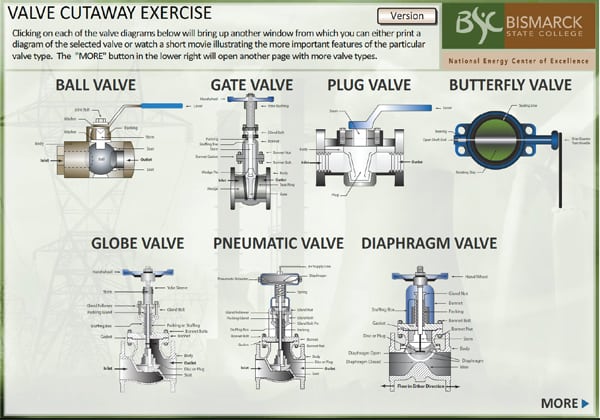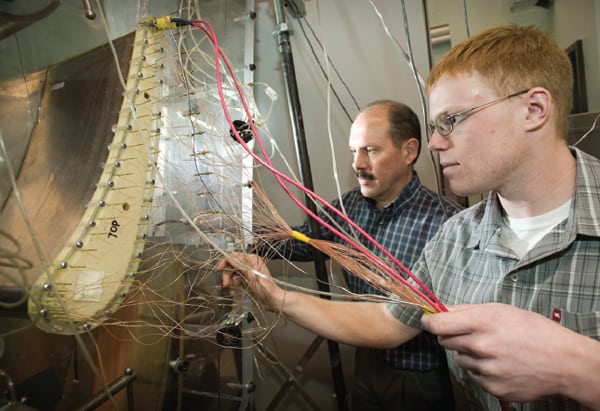Going the Distance: Online Courses for Power Industry Professionals
Online learning is opening up new opportunities for those unable to attend classes on campuses. Bismarck State College and the University of North Dakota, for example, offer innovative online courses and degree programs to students who want successful careers in the electric power industry.
Through hard work and a desire to advance his career via education, Doug White has moved up from his first job in 1988 at Muscatine Power & Water (MPW) doing custodial work to his current position as MPW maintenance supervisor. His job consists of budgeting, handling human resource issues and expenditure approvals, and training other employees. White’s career advancement has been made possible by the education he received through online college courses at Bismarck State College, along with some local community college classes in Muscatine, Iowa (Figure 1).
 |
| 1. Balancing work and education. Doug White, a maintenance supervisor at Muscatine Power & Water, has advanced his career by taking online college courses from Bismarck State College as well as some local community college classes. Courtesy: Muscatine Power & Water |
White told POWER in April: “It took me six years to get my AAS [associate in applied science] degree, and I believe it will take that long to finish my BAS [bachelor of applied science] degree in energy management through online classes. It’s not really a big deal for me to finish quickly. I seem to get more out of the experience if I salt it in my life a little at a time.”
He gave his perspective on the advantages of taking online distance learning classes versus traditional engineering classes taught on a college campus.
“The obvious advantage is the flexibility of class hours; I can work on it anytime, anywhere. I worked on one class sitting in a beach chair next to the ocean in Mexico—that’s flexibility,” he said. “The downside to the flexibility is disciplining yourself to stay on track and being a good class participant. It is very easy to ‘do it later’ when you don’t have a fixed schedule.”
White emphasized that MPW has been very supportive, by reimbursing tuition based on his grades and paying for half of his materials. Additionally, “they were flexible when I needed time off and have relaxed grade requirements [for purposes of qualifying for company tuition reimbursement] when I was working outages and going to school at the same time. MPW has always encouraged education and uses education as one of the criteria for advancement.”
White’s experience exemplifies how students who are interested in careers in the power industry can now obtain their education remotely via online classes.
Distance Learning Takes Root in the Power Industry
In the past, POWER has presented a wide variety of articles about educating personnel in the electric power generation sector. Examples (all available at https://www.powermag.com) include “Training Tomorrow’s Power Industry Workers” (March 2011), “Power Industry Needs to Do a Better Job of Educating and Messaging” (July 2009), “Generation Next: Strategies for Recruiting Younger Workers” (July 2008), and “World-Class Teaching Lab Prepares Next Generation of Plant Operators” (June 2006).
This article focuses on newer educational opportunities available through online classes. Two educational institutions that are pioneers in this area are Bismarck State College (BSC) in Bismarck, N.D., and the University of North Dakota (UND) in Grand Forks. Both offer online courses and degree programs that focus on the electric power industry. Their courses appeal to students who want to broaden their workplace skills but who might not be able to attend classes on college campuses.
Bismarck State College Moves into the Digital Age
The National Energy Center of Excellence (NECE) is located on the BSC campus (Figure 2). Joan Trygg, BSC marketing and advising manager, told POWER in February that “The first offering of online energy-related courses was in 1999 with about six courses as a pilot test.”
 |
| 2. Digital powerhouse. The National Energy Center of Excellence (NECE) is located on the Bismarck State College campus in Bismarck, N.D. The NECE offers seven online associate in applied science degrees that focus on the electric power industry. Courtesy: Bismarck State College |
In 2007, the NECE was recognized by the U.S. Department of Energy as the National Power Plant Operations, Technology, and Education Center. Now the NECE offers more than 100 online courses, available at various times throughout the calendar year, dedicated to serving the workforce needs of the energy industry (Figure 3). Trygg explained that the move to offering online courses developed for several reasons:
 |
| 3. Cyber chalkboard. This valve cutaway exercise is typical of those used in online classes. The NECE offers more than 100 online courses that are available at various times throughout the calendar year. Courtesy: Bismarck State College |
- Online learning is flexible learning in a number of ways. Students anywhere, even in rural areas, can complete their coursework online to gain the knowledge and skills they need. Students can focus full time on earning a degree or complete necessary training while working their jobs. There isn’t a minimum or maximum number of years in which a program must be completed. This type of flexibility offers students an optimum learning experience.
- Offering courses online provides companies with a cost-effective way to offer training either as an entire degree program or as customized plans to meet their training program needs. Several companies have used many of the NECE’s offerings to train new hires and existing personnel.
- Companies want to invest in their employees and their professional growth in the form of education. If the education they are pursuing is a direct fit with their current or future responsibilities, the return on that investment is much higher.
- Companies can develop workforce plans with the NECE to train people from their local community (known as the “Grow Your Own” model). Such programs increase the employee retention rate, which is important for most facilities.
“We strive to ensure our online courses closely mimic the experience students have in the classroom with all of the degree-granting courses led by an experienced instructor,” said Wade Vogel, NECE program manager. “Offering our courses online allows us to attract high-quality instructors from all over the country, in addition to our highly dedicated faculty located on our campus, who possess very diverse industry backgrounds.”
The NECE offers seven online AAS degrees that focus on the electric power industry: power plant (fossil fuel), nuclear power, renewable generation, electrical transmission systems, electric power technology, instrumentation and control, and the newest program coming this fall, water and wastewater technology.
“The renewable generation programs are broad and include solar, wind, hydro, and geothermal, and also touch briefly on newer technologies associated with tidal power and fuel cells,” Vogel said.
NECE also offers courses related to transmission and distribution as well as a BAS in energy management to prepare technical individuals for mid- to upper-level management positions.
Vogel pointed out that “in addition to these college credit programs, we also have a wide array of non-credit offerings online for the energy industry.” These include U.S. Department of Labor–approved apprenticeship programs (electrical, instrumentation, mechanical, metering, relaying, substation, system protection, and telecommunications), industry prep courses, and stand-alone courses in areas such as smart grid and switching. He explained that BSC is recognized by the North American Electric Reliability Corp. (NERC) as a continuing education provider that adheres to NERC continuing education program criteria.
Another resource that is becoming quite popular is the Industry Resource Connection, which consists of a wealth of training aids in the form of animations and simulations designed for training employees in the energy industry. Companies can purchase a six-month license for up to 25 concurrent users.
For more information, visit BSC’s website (http://energy.bismarckstate.edu/) or e-mail [email protected].
University of North Dakota: A Leader in Online Education
U.S. News & World Report recently ranked UND as No. 3 in the nation for its delivery of student services and tech support for online bachelor’s degree programs. In addition, the Guide to Online Schools ranked UND as one of the “Top 3 Military-Friendly Online Schools” and as one of the “Top 12 Non-Profit Online Schools” in the country.
UND offers several online bachelor’s degrees in engineering. Its online bachelor’s degrees in chemical, civil, electrical, and mechanical engineering are accredited through the Accreditation Board for Engineering & Technology (ABET), the same board that approves programs at brick and mortar engineering schools.
“The UND School of Engineering and Mines is very proud to offer high-quality and affordable education opportunities to nontraditional students who typically work full time and want to complete their engineering education. Our ABET-accredited programs are offered via distance delivery of lectures and on-campus condensed summer laboratories,” Hesham El-Rewini, the dean of UND School of Engineering and Mines, told POWER in February. He noted that the ABET accreditation assures students that UND’s programs meet the highest standards in engineering education.
For students interested in pursuing careers in the electric power industry, UND’s Department of Electrical Engineering has an active teaching and research program focused on electric and energy power systems. Both on-campus and distance-learning students may take undergraduate and graduate-level courses specific to electric power and energy systems. Distance-learning students from across the nation who are currently working in the electric utility industry can take UND’s online electrical engineering courses.
El-Rewini pointed out that “in addition, students contemplating careers in the electric power industry would be well-served by taking mechanical engineering courses such as intermediate thermodynamics, gas turbines, dynamics systems and controls, and material properties and selection. UND’s mechanical engineering graduates typically find employment in the electric power industry in the areas of plant design, plant maintenance, distribution system design, and plant/project management.”
UND’s Distance Engineering Degree Program is designed to offer engineering students access to an entire engineering degree from an accredited program. In addition, UND has focus areas within the distance degree programs that allow students to take electives related to their future engineering jobs. El-Rewini noted that “for instance, the electric power and energy courses offered by the UND Department of Electrical Engineering apply to various forms of electric power plants, including coal, gas, and oil.”
UND distance-learning students may take a variety of electric power and energy-related courses, including: “Electric Drives,” “Power Systems I,” “Power Electronics,” “Renewable Energy Systems,” “Power Systems II,” “Engineering Systems Reliability,” and special topic courses related to power systems. The university also offers courses that focus on wind energy, solar photovoltaic facilities, fuel cell power systems, and geothermal power systems.
In addition, mechanical engineering courses on topics such as intermediate thermodynamics and gas turbines are applicable to many processes found at coal- and gas-fired power plants. Similarly, a course in system dynamics and controls is applicable to a wide variety of power system designs that incorporate electrical, mechanical, and hydraulic elements.
“The lecture classes are offered 100% online,” El-Rewini said. “Distance students are able to view recorded lectures via the Internet at any time.”
Online lectures are recorded for distance students as the instructor teaches the on-campus students. Students take exams in their own communities by arranging for proctors to administer the exams according to guidelines set by the instructors.
El-Rewini explained that “the lab components of the program are offered in a very condensed format on the UND campus during the summer. To complete the hands-on portion of the lab, distance students are required to be on campus for five to 14 days” (Figure 4).
 |
| 4. Hands-on training. The lab components of the University of North Dakota’s (UND) online program are offered in a very condensed format on the UND campus during the summer. To complete the hands-on portion of the lab, distance-learning students are required to be on campus for five to 14 days. Courtesy: University of North Dakota |
Typically, students complete their written reports after returning home. Although it varies from program to program, about 90% or more of the required credits can be completed remotely, El-Rewini said.
For more about UND’s distance engineering degree programs, call 1.800.CALL.UND or visit http://www.engineeringonline.UND.edu.
A Good Return on Investment
All students enrolled in the NECE online programs pay the same tuition rate regardless of their state residency, Trygg explained. Tuition cost varies, depending on the program, but it falls within the range of $232 to $281 per semester credit hour (including fees). The cost of books is manageable at around $350 per semester.
“Students in our NECE programs are fortunate because many of our energy company partnerships provide great scholarships to assist them with tuition expenses,” Trygg said. “In addition, many of our industry-employed students can utilize their company education plans, which is a wonderful benefit to the students and is an excellent investment in the future of the company.”
Within the NECE program, the full cost for a two-year degree is typically under $18,000. Considering that many of the program’s graduates start in jobs at salaries as high as $40+ an hour, the financial payoff is an attractive return on investment for the students.
The NECE offers career services for students in the forms of assistance with resume writing, interview skills, and finding job openings. A free service, the Job Seekers Network, is available for companies and students to review position openings and apply for jobs. Companies also use this service to post their openings at no cost.
In contrast, at UND, tuition for distance engineering courses is charged based on the student’s state of residency. Currently, North Dakota resident tuition and fees is $465.49 per credit, and nonresident tuition is $868.61 per credit.
El-Rewini pointed out that UND has reduced-tuition arrangements with several states that allow out-of-state students to pay less than the full nonresident rate. Students who are active duty military members, veterans, or spouses/dependents of a member of the U.S. Armed Forces qualify for a tuition-waiver program that is equivalent to the tuition charged to North Dakota residents, regardless of their residency status.
Any online student enrolled in the UND program is eligible to apply for federal financial aid, provided that they are fully admitted to their academic program and enrolled in at least six credit hours per semester. A variety of options may be available, including loans, grants, and scholarships.
“UND has many alumni in the power industry who share opportunities for co-ops and permanent employment in their firms with current students,” El-Rewini said. “This information is posted on UND’s internal website and distributed to students for them to follow up with the companies. Some companies will send representatives to the UND campus to speak about career opportunities with their firms and to specifically recruit UND graduates to fill open positions.”
Bringing the Real World into the Classroom
White appreciates that his NECE instructors have extensive experience in an industrial environment but specialize in a particular area. They work from a class plan but also bring their experience to the table. They use examples of things that have happened in their careers to relate to the subject at hand.
“The instructors stimulate class discussions and lead us students down roads that get people looking at all possibilities,” White said. “The instructors do not just teach from a book; they live it and can help you apply what you have learned to your job.”
White explained that the NECE online classes seem to be mostly made up of people already working in the industry or related industries and in every position. White said “the students sometimes contribute as much to the experience as the instructors. The students give examples of issues they have dealt with that pertain to the class subject and how things worked out for them.”
UND also provides a large amount of practical training for its online students. “The UND Departments of Electrical and Mechanical Engineering have working relationships with many of the local and regional electric utilities,” El-Rewini said. “These utilities are constantly hiring UND’s graduates and/or offering them summer co-ops, internships, or scholarships.”
Some of the technical staff working at these utilities attend and teach portions of UND’s electric power systems classes, El-Rewini explained. As part of their lessons, they assign practical real-life class projects. Some of UND’s graduate students also work and do collaborative research on problems or challenges electric utilities are investigating.
Providing Greater Access to Quality Education
Through their innovative online classes, Bismarck State College and the University of North Dakota offer students interested in power industry careers a winning combination of a rigorous academic education and real-world practical training. Online education is opening up learning opportunities to many nontraditional students who, in turn, will be able to make valuable future contributions to the electric power industry.
— Angela Neville, JD is POWER’s senior editor.